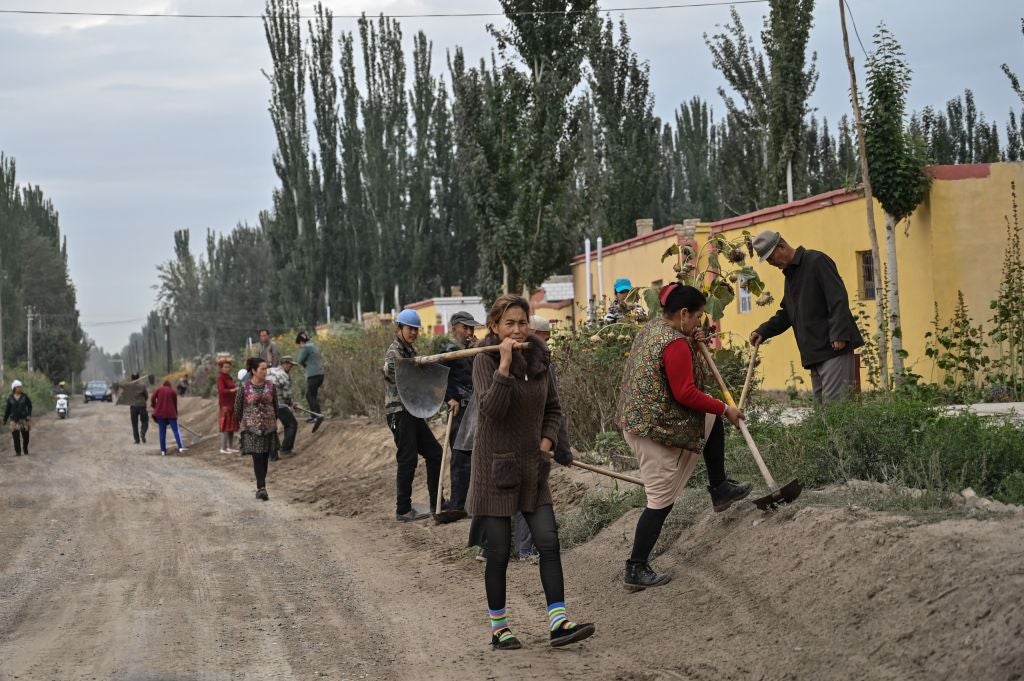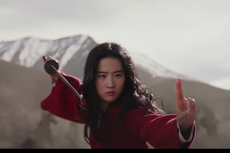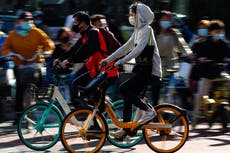The Independent's journalism is supported by our readers. When you purchase through links on our site, we may earn commission.
Uighurs are facing eradication in China and major clothing brands are complicit
More than 80 percent of China’s cotton is grown in the Uighur region, approaching 20 per cent of all global production – we cannot simply wish away this elephant in the room, says Louisa Greve

China is implementing a top-down, systematic campaign to eradicate Uighur identity, and eliminate Uighurs as a distinct people, through mass internment, pervasive surveillance, and forced labour.
Clothing companies are forced to grapple with this horrific reality because China is the world’s second-largest producer of cotton. More than 80 percent of China’s cotton is grown in the Uighur region, approaching 20 per cent of all global production. As a result, almost every major clothing brand and retailer sourcing cotton products from China is potentially implicated.
While China’s ethno-religious concentration camps were whitewashed as “re-education” and “vocational training” centres, the main euphemism for the forced labour system is “poverty alleviation”. As early as 2015, the Xinjiang government announced a plan to expand the textile and garment industries in the region, to employ one million workers by 2023. The workforce would be drawn primarily from the southern Uighur heartland. In practice, this expansion was driven by government recruitment quotas and subsidies for companies to take on the targeted workforce.
The Chinese state’s population-transfer and forced-labour programs today are part and parcel of atrocities committed in the drive to forcibly assimilate the population. For Uighurs and Kazakhs who physically survived detention camps and were lucky enough to avoid subsequent prison sentences of 10-15 years, to refuse a government-organised “job placement” would be to risk returning to the hell of the camps.
Under these conditions, operating ethically anywhere in the Uighur region is impossible. Reliable “social audits” of factories in the Uighur region to determine the presence of forced labour is a fantasy. One Chinese company operating a factory inside an internment camp was awarded a “gold” certification from an ostensibly reputable certification body in 2019.
The forced-labor scheme also extends far beyond the Uighur region, however. The March “Uighurs for Sale” report by the Australian Strategic Policy Institute (ASPI) found evidence of the forced transfer of at least 80,000 Uighurs to factories across China that make goods for global brands between 2017-19. The report found that conditions in the factories “strongly suggest forced labour”, with transferred workers enduring round-the-clock monitoring, surveillance apps on their phones, controls on their movement, and mandatory “ideological training”. These factories figure in the supply chains of many well-known brands in the technology, automotive, and garment sectors.
Global brands now face a stark choice. They can continue to claim that they have lived up to their ethical codes by conducting audits that have “found no evidence” of forced labour in supplier factories, as many companies said in response to the ASPI report. Or they can recognise that doing business with any partner in the Uighur region, or any intermediary that might be doing business with Xinjiang enterprises, means they are choosing to conduct “business as usual” in the midst of mass atrocities.
The Coalition to End Forced Labour in the Uighur region, launched in July, is telling companies that their reputation is on the line. Backed by more than 250 worker-rights organisations, trade unions, socially responsible investors and Uighur groups, the Coalition makes it simple: if you are an ethical company, you will commit to ending all ties with suppliers that are potentially associated with the Chinese government’s monstrous scheme of Uighur forced labour.
Some trade associations haven’t got the message. Silence rules at the UK Fashion & Textile Association (UKFT), which describes itself as “the most inclusive network for fashion and textile companies in the UK”, and the Association of Suppliers to the British Clothing Industry, “the UK's leading clothing supply chain association”.
It is curious that these organisations have nothing to say about “one of the most egregious human tragedies since the Holocaust”, denounced in a joint statement by five serving Church of England Bishops, 20 senior British rabbis, and 50 other faith leaders around the world.
The International Apparel Federation, in its March statement about Xinjiang, refers to the difficulties inherent in addressing human rights given “the complex landscape of the Xinjiang situation” and calls for a “balanced” approach that will avoid measures “that inevitably hurt a huge number of businesses and their employees acting in good faith”. Ralph Lauren, to take one example of an ethical approach, states that it is deeply troubled by the reports of forced labour in and from Xinjiang” and has “zero tolerance” for forced labour.
At least BRC, the trade association for retail businesses in the UK, plans to convene a workshop in August for its members on addressing human rights risks in Xinjiang. Five US clothing, footwear, and retail industry groups said in a joint statement on Xinjiang, responding to the Coalition launch, that “ensuring that forced labour does not exist in our supply chains is a key priority”. The next step in addressing “this critically important human rights issue” will be acknowledging that it’s not just about forced labour.
The brands and their industry associations need to realise that a laser-focus on forced labour is a must. But it can’t stop there. For the Uighurs, forced labour is merely the commercial channel of an even more monstrous scheme to crush an entire people though mass detention, torture, forced ideological “transformation”, breaking up families, and forcibly limiting births, a tight fit for the definition of genocide.
Brands simply cannot let a focus on “zero tolerance” for forced labour be an excuse to wish away the elephant in the room: the Chinese government’s choice to conduct a 21st-century genocide and everyone else’s choice to let them get away with it.
Louise Greve is director of global advocacy for the Uyghur Human Rights Project
Join our commenting forum
Join thought-provoking conversations, follow other Independent readers and see their replies
Comments



Bookmark popover
Removed from bookmarks